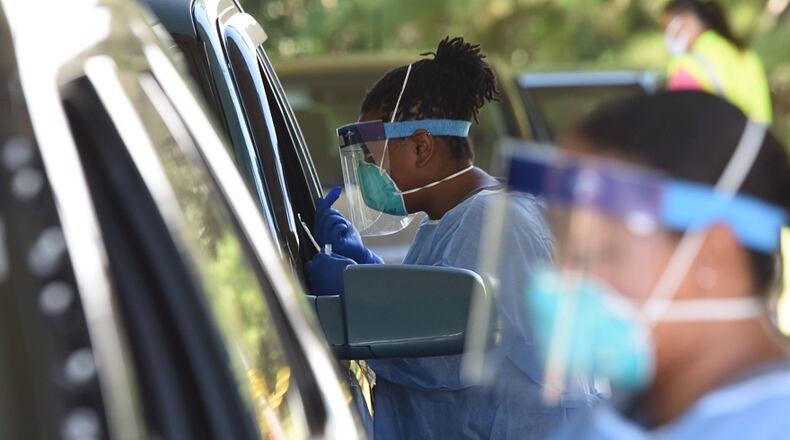The dramatic surge in coronavirus infections over the past month has once again overwhelmed Georgia's testing infrastructure and pushed it to the breaking point five months into the pandemic.
Last week, the seven-day rolling average of new cases was more than four times what it was June 15.
A Fulton County Superior Court judge ordered Gov. Brian Kemp and Atlanta Mayor Keisha Lance Bottoms into mediation over their legal dispute about how to best respond to the coronavirus pandemic.
Here’s a look at major developments over the past week related to the coronavirus.
Long lines, delayed results: virus surge overwhelms testing in Georgia
The more than 20,000 tests Georgia processed per day from June 28 to Thursday are only about a third what a Harvard study says is needed to mitigate spread in the Peach State and fewer than one-10th what Georgia needs to suppress it, according to an online tool developed by NPR.
A lack of widespread and reliable testing led Georgia and other states to ration tests and order residents to shelter in place earlier this year. Capacity has since grown, but not to the scale experts feared would be needed.
In April, when tests were rationed and Georgia ranked near the bottom in testing per capita nationally, Gov. Brian Kemp called the situation "unacceptable." At a news conference Friday morning, he used the same term to describe the current situation.
“This is simply unacceptable, and Georgians deserve better,” Kemp said.
Kemp announced a partnership with North Carolina-based Mako Medical to provide supplies and critical lab capacity to process 10,000 coronavirus test samples per day. A news release said Mako will provide results within 48 hours, on average.
Credit: ALYSSA.POINTER@AJC.COM
Credit: ALYSSA.POINTER@AJC.COM
Judge orders Kemp and Bottoms to mediation
A Fulton County Superior Court judge ordered Gov. Brian Kemp and Atlanta Mayor Keisha Lance Bottoms into mediation to avoid a court battle over his lawsuit challenging the city’s mask mandate and other restrictions.
Bottoms first revealed during a taping of "The Tonight Show" that she and Kemp talked Wednesday about a way to "agree to disagree" without a courtroom showdown.
The mayor said the two agree "masks save lives" and that they both have the interests of public health at heart.
"We will continue to work together to try to iron out those things that we disagree on and hopefully we can move past it," she said. "It is not my desire as mayor of this city to have a very public fight with the governor of this state."
It was a notable de-escalation of a recent war of words between the two politicians, who have assailed each other over the past two weeks as their public relationship, functional if not warm, steadily disintegrated into bitter fighting over how to handle the pandemic and public safety.
Kemp’s office said Thursday that the conversation was “productive” and indicated that the mayor initiated the discussion, but it declined to comment further.
Atlanta is among more than a dozen Georgia cities with mask mandates, but the only one to also institute "phase one" restrictions.
Local site works on plasma therapy
COVID-19 survivors could be key to helping others fight the disease by simply donating their blood.
The idea is the antibodies in survivors’ plasma can help sick patients fend off the infection.
In the absence of a vaccine or proven treatments, doctors are increasingly looking to plasma therapy — a century-old approach to a new and raging public health emergency. Hospitals have been transfusing plasma directly into sick patients.
And now, researchers are also working on a plasma-derived therapy that could be available this year, even well before a vaccine.
And a major hub for the research is in Georgia.
Takeda Pharmaceutical, one of the largest biopharmaceutical firms in the world, has a $2 billion state-of-the-art facility covering more than 1 million square feet just east of Covington. That facility, which employs about 1,000, now has a dedicated space and team of researchers focusing on the potential COVID-19 treatment called hyperimmune globulin, a type of plasma-derived therapy that could provide a reliable, consistent and more potent level of antibodies. The treatment would also have a longer shelf life of 24 to 36 months, compared with 12 months for convalescent plasma transfusions.
Several other pharmaceutical companies, including competitors such as CSL Behring, teamed up with Takeda to form an alliance to accelerate the development of the therapy. The alliance hopes to start clinical trials at several hospitals in the U.S. during the coming weeks. The facility in Georgia will manufacture the potential therapy for the U.S. trials.
Staff writers J.Scott Trubey, Willoughby Mariano, Greg Bluestein, Jeremy Redmon and Michael E. Kanell contributed to this article.
About the Author
Keep Reading
The Latest
Featured




